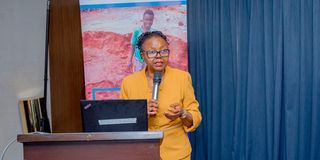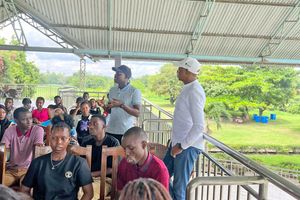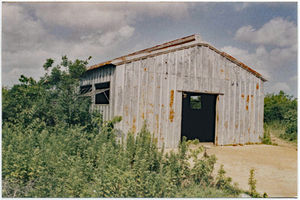National workshop on climate change adaptation kicks off in Dar es Salaam

The LoCAL Facility Project Coordinator, Ms Aine Mushi, speaks to trainees at the workshop.
What you need to know:
- The workshop seeks to deepen stakeholder engagement and strengthen the integration of climate resilience into district-level planning and budgeting.
Dar es Salaam. A three-day national workshop aimed at enhancing understanding of climate change adaptation priorities and financing mechanisms has commenced in Dar es Salaam today, drawing more than 80 participants from the government, development partners, and Local Government Authorities (LGAs).
The workshop, organised by the United Nations Capital Development Fund (UNCDF) under its Local Climate Adaptive Living (LoCAL) Facility Phase II in Tanzania, seeks to deepen stakeholder engagement and strengthen the integration of climate resilience into district-level planning and budgeting.
According to LoCAL Facility Project Coordinator, Ms Aine Mushi, the workshop will equip participants with tools to better distinguish between climate change and weather variability, assess climate impacts, and formulate district budgets responsive to environmental challenges.
“We have prepared specific tools to help them identify the difference between climate change and weather changes. We will also train them on how to propose climate-sensitive budgets and assess the impact of climate change,” said Ms Mushi.
The training brings together representatives from 23 district councils, with the intention of cascading the knowledge to all districts across the country. It emphasises gender-responsive and participatory approaches to climate adaptation.
Ms Mushi added that the workshop also aims to increase awareness of climate financing opportunities available through the LoCAL mechanism and build the capacity of LGAs to assess vulnerabilities and integrate adaptation measures into planning frameworks.
Speaking at the event, a Senior Adviser for Agriculture, Climate Change, and Research at the Royal Norwegian Embassy and one of the funders of the programme, Mr Yassin Mkwizu, noted the importance of ensuring funds reach rural and village levels.
“The work being done by UNCDF, facilitated by experts from the Local Government Training Institute (LGTI) and the Institute of Rural Development Planning (IRDP), will enhance capacity and skills at the grassroots,” said Mr Mkwizu.
A participant who spoke on condition of anonymity expressed hope that the workshop would provide clearer guidance, citing challenges in the field due to a lack of proper guidelines and insufficient staff training on climate change policies.
Launched in Tanzania in 2018, the LoCAL Facility operates under a decentralised climate finance framework. Between 2021 and 2023, the initiative was piloted in Chamwino, Mpwapwa, and Kondoa districts in the Dodoma Region, reaching more than 800,000 beneficiaries.
LoCAL Phase II is supported by the Royal Norwegian Embassy (Tanzania), the Belgian Embassy, the European Union (EU), the Irish Embassy (Tanzania), and the Sustainable Development Goals (SDG) Fund.





